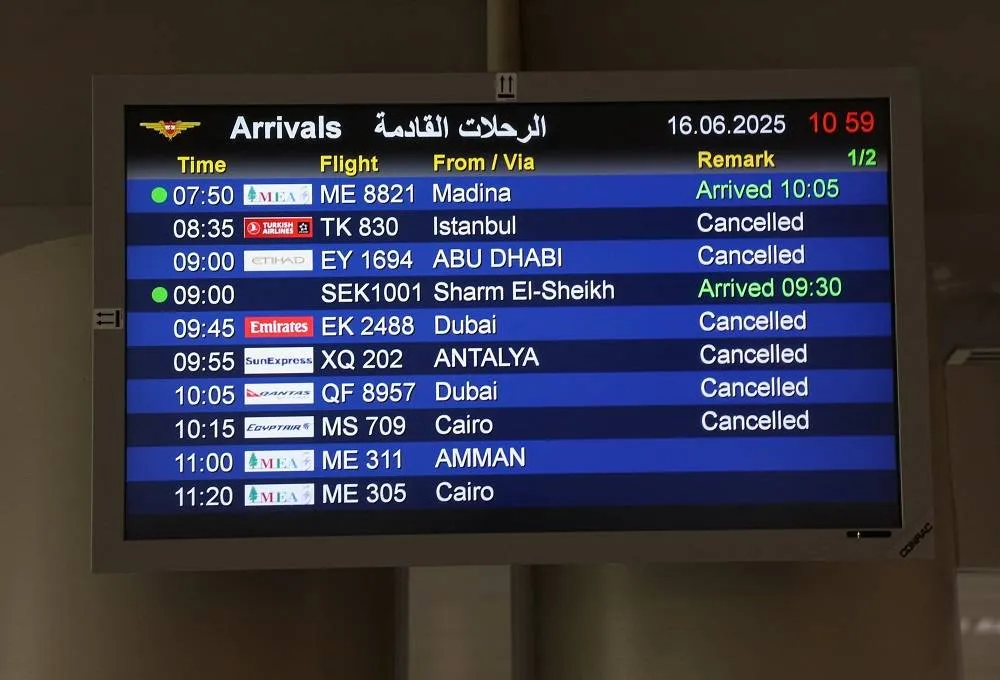The escalating military conflict between Israel and Iran is creating mounting challenges for Middle Eastern airlines, including airspace closures and rerouted flight paths, all of which are driving up operational costs.
While Gulf carriers are relying on alternative routes – albeit more expensive ones – private airlines in neighboring countries face the risk of exiting the market altogether if the crisis persists.
Countries geographically close to the conflict, such as Iraq, Lebanon, and Jordan, are increasingly concerned about the conflict’s deepening impact on the civil aviation sector, which represents one of the most sensitive branches of their economies. The threat is no longer confined to security concerns alone, but is now hitting the economic core of these nations.
Dr. Hussein Al-Zahrani, an aviation investor, told Asharq Al-Awsat that countries geographically tied to the Iran-Israel conflict are already facing direct complications in the aviation sector. These include airport closures and rerouted flights, such as the diversion of Jordanian planes to Egypt’s Cairo and Sharm El Sheikh, or grounding aircraft entirely.
Al-Zahrani noted that national carriers in these countries, particularly state-owned airlines, are more likely to receive government support to help them weather the storm. However, the limited number of private airlines operating in these regions may not survive a prolonged crisis.
Iraq has approximately five carriers, Lebanon one, Syria two (one of which is government-owned), and Jordan three; all of which could suffer significantly if the conflict drags on.
In contrast, Gulf airlines have contingency plans in place, Al-Zahrani said, although they are not immune to the repercussions.
Increased flight distances and restricted airspace will present logistical and financial burdens, though Gulf carriers are more resilient and often absorb the extra costs themselves. In many cases, rerouting results in only minor extensions – around 20 minutes – which allows airlines to maintain stable pricing.
He cited exceptions, such as some northern-bound Kuwaiti flights to Europe that typically rely on Iraqi airspace. These will now need to reroute via Saudi airspace, then over the Mediterranean to reach Europe, significantly increasing flight durations and operating expenses.
Al-Zahrani also pointed out that many transcontinental flights between East and West, which pass over Saudi and Iraqi airspace, will be disrupted if closures in conflict zones persist. This may force airlines to reschedule, reroute, or even suspend certain long-haul routes if they become economically unfeasible.
Aviation-sector companies are considered foundational contributors to national budgets, particularly in countries where the industry plays a major economic role. According to Al-Zahrani, these entities are typically the first to suffer in the event of military conflicts, especially as oil prices rise and long-haul operations become increasingly expensive.
Observers warn that if Iran were to close the Strait of Hormuz – a vital maritime corridor connecting the Arabian Gulf to the Gulf of Oman and the Arabian Sea – it would further heighten concerns for both maritime and air transportation companies, given the anticipated spike in insurance costs and risk premiums should the crisis continue.
Economic analyst Marwan Al-Sharif told Asharq Al-Awsat that airlines may be able to navigate the crisis if it remains short-lived, especially those operating in proximity to the warring parties. However, if the conflict drags on, the resulting losses could grow more severe, weakening the financial viability of many carriers amid rising fuel costs, airspace restrictions, and surging insurance rates.



